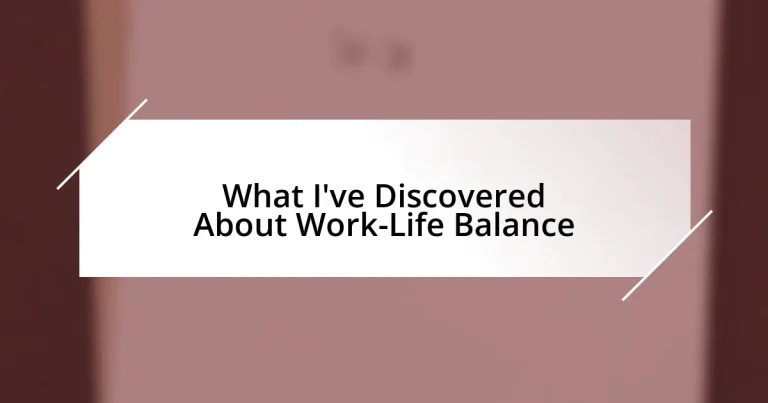Key takeaways:
- Work-life balance is a subjective concept that requires individual reflection and prioritization of both personal and professional needs.
- A healthy work-life balance enhances productivity, improves relationships, and contributes to better health and personal growth.
- Setting firm boundaries, prioritizing self-care, and learning to say “no” are essential strategies for achieving a fulfilling balance.
- Maintaining balance leads to long-term benefits, including reduced stress, improved job performance, and deeper connections with loved ones.
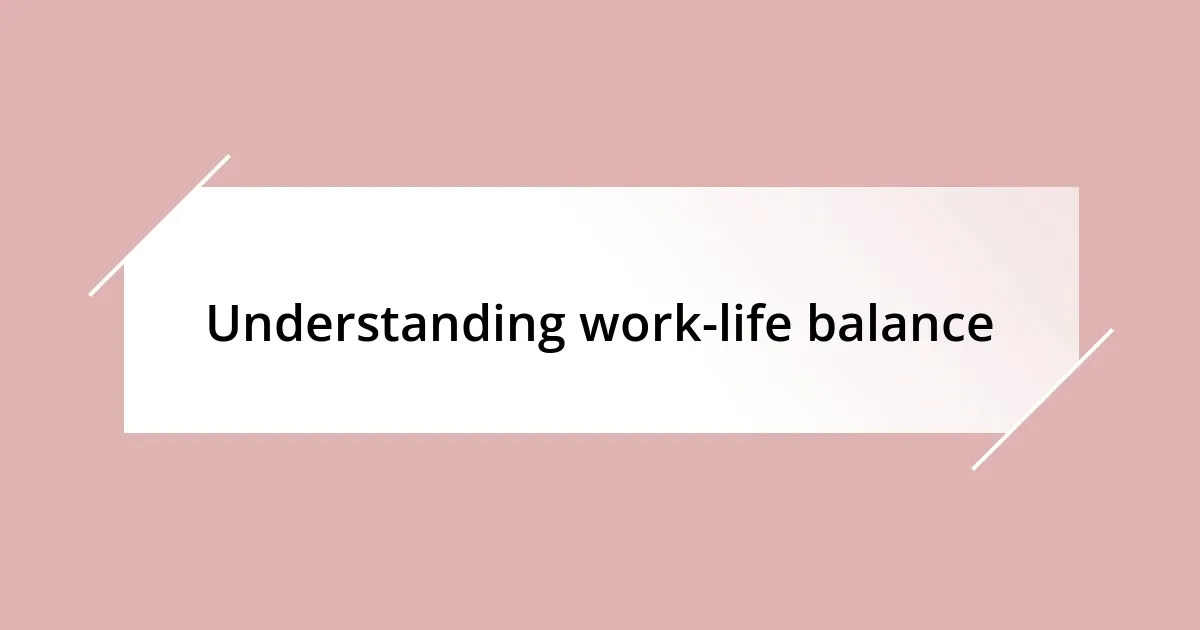
Understanding work-life balance
Work-life balance is often seen as the delicate dance between professional responsibilities and personal life, but it’s so much more than that. I remember when I first started my career, I felt like I had to choose between my job and my family; the stress was overwhelming. Isn’t it frustrating to think that we often put our work at the forefront, forgetting the things that truly matter?
We often envision work-life balance as a 50/50 split, but in reality, it’s more like a see-saw that shifts based on our needs at any given time. There were weeks when deadlines loomed, and I had to prioritize work, but I made a point to carve out family time on weekends. How often do we reflect on what balance looks like for us personally, rather than simply going by societal standards?
It’s crucial to recognize that work-life balance is a subjective concept—it means different things to different people. I’ve learned that finding my own version has involved trial and error, like learning to say no to extra commitments when I’m already stretched thin. Have you ever experienced that moment when you realize you’re out of sync with your own priorities? Finding that alignment can feel like a breath of fresh air.
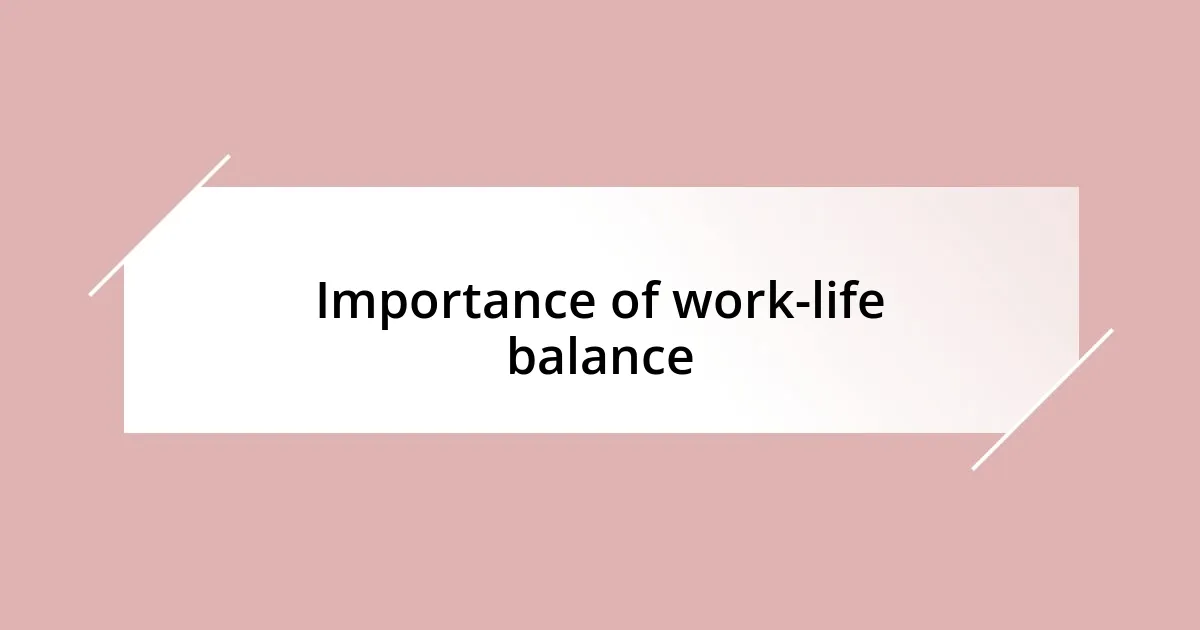
Importance of work-life balance
Work-life balance is incredibly important in today’s fast-paced world. I’ve seen plenty of colleagues fall into the trap of overworking, thinking it will lead to better recognition or promotions, only to feel burnt out and disengaged. Personally, it took a serious illness for me to understand that no job is worth sacrificing my health or happiness. Achieving balance isn’t just about managing time; it’s about prioritizing well-being in all aspects of life.
The benefits of maintaining a healthy work-life balance are numerous:
- Enhanced Productivity: A well-rested mind is more focused and efficient in achieving goals.
- Better Relationships: Spending quality time with loved ones strengthens connections and improves emotional support.
- Improved Health: Lower stress levels significantly contribute to better physical and mental health.
- Increased Job Satisfaction: Employees who feel balanced are generally happier at work, leading to reduced turnover.
- Greater Personal Growth: Finding time for hobbies and interests outside of work fosters creativity and personal development.
These experiences remind me that prioritizing balance isn’t merely an HR buzzword; it’s a necessity for a fulfilling life.
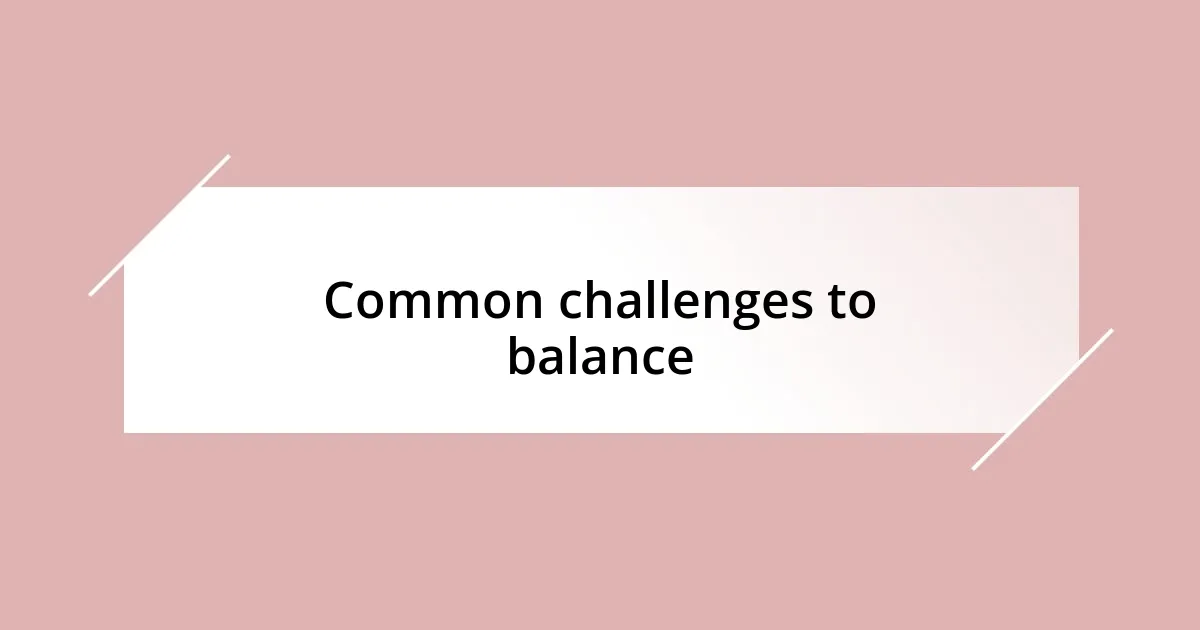
Common challenges to balance
Finding a work-life balance is often easier said than done, especially with the pressure of deadlines and the constant connectivity of technology. I’ve had days when my work emails infiltrated family dinners, and I felt torn between responding immediately and being present for my loved ones. Have you ever caught yourself checking your phone while spending time with friends, only to realize you’re missing out on real moments?
The struggle can also come from loving what you do. When you’re passionate about your job, it’s easy to get caught up in your work and overlook personal commitments. I remember a period when I was so absorbed in a project that weeks flew by without a visit to my favorite coffee shop. It made me realize that while it’s commendable to be dedicated, neglecting your personal life can lead to feelings of dissatisfaction in both spheres.
Then, there’s the challenge of societal expectations and workplace culture. I’ve seen organizations that glorify long hours, creating an environment where saying “no” feels like a career risk. It made me ponder: how do we change this mindset? I’ve learned that advocating for a healthier approach starts with open conversations, both at work and home, to align priorities and needs.
| Challenge | Example |
|---|---|
| Work Interruptions | Emails during family time |
| Passion Overload | I missed personal events for work projects |
| Workplace Culture | Long hours seen as a badge of honor |
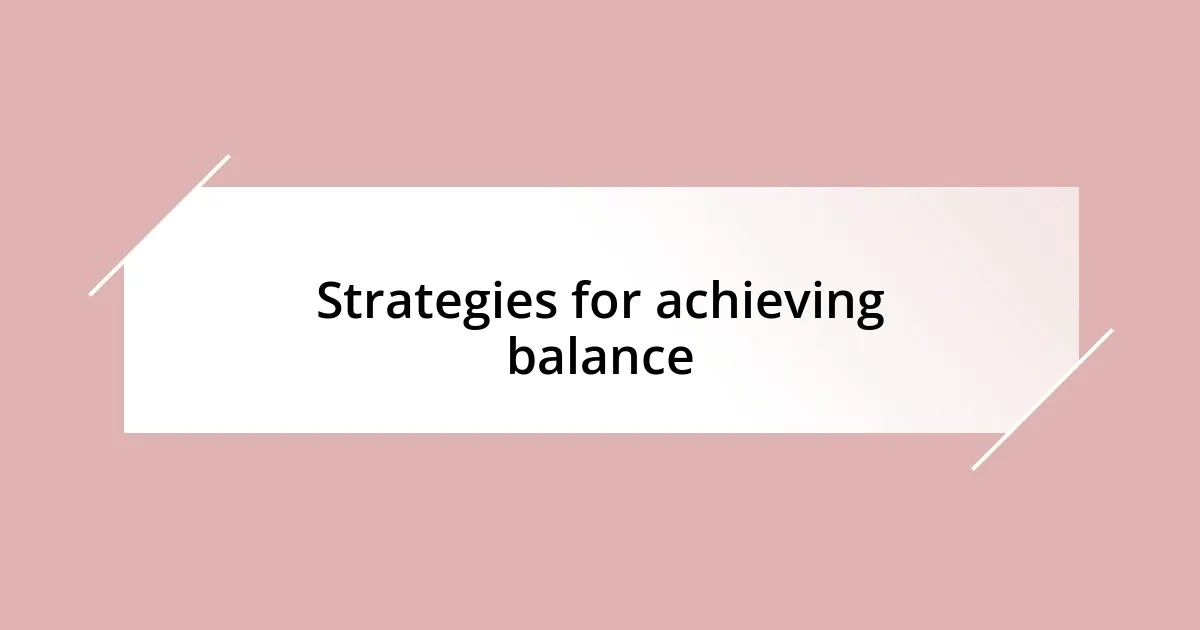
Strategies for achieving balance
One effective strategy I’ve found is setting firm boundaries between work and personal time. I remember the day I decided to log off by 6 p.m. sharp; it felt liberating! Initially, the urge to check emails lingered, but I noticed how much clearer my mind became. What if you also structured your day to carve out precious ‘me time’?
Prioritizing self-care is another crucial aspect of achieving balance. I used to think squeezing in a workout was impossible during busy weeks, yet implementing short exercise routines made a significant difference. Just 20 minutes of physical activity can reinvigorate your spirits and boost productivity. Have you considered how dedicating time to hobbies or relaxation could enhance your overall well-being?
Lastly, I’ve learned the power of delegation, both at home and at work. When I finally let go of the “I can do it all” mentality, I felt an incredible weight lift. Engaging family members in household chores and entrusting teams with responsibilities not only fosters collaboration but also builds mutual trust. If you’re carrying a heavy load, why not share the responsibility? It truly creates space for a more balanced life.
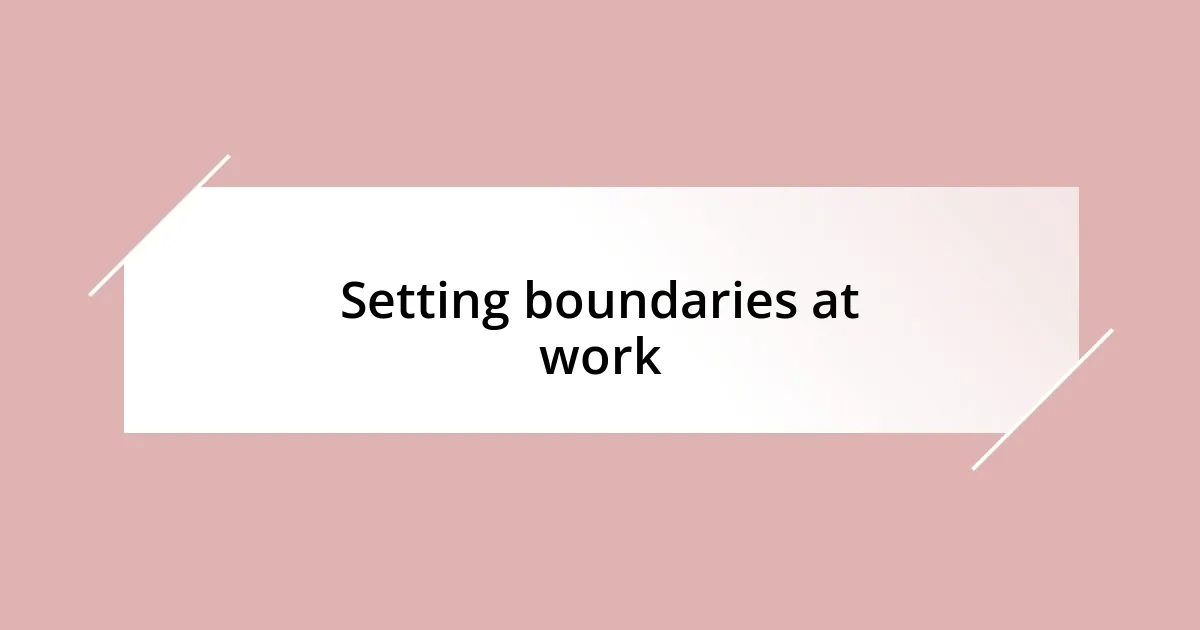
Setting boundaries at work
Setting boundaries at work is essential to maintaining my well-being. I recall a time when I was always available for my boss, even outside of office hours. It started to feel like I was on call 24/7, and I realized I needed to draw a line. Have you ever felt like your job had taken over your life? Making a commitment to leave work at work not only helped me feel less drained, but also improved my overall productivity during working hours.
Establishing specific times to disconnect from work-related communication was a game changer for me. I remember the first week I turned off notifications after 6 p.m.; my evenings transformed into cherished moments with my family. I felt more engaged during dinner and could enjoy that simple time together without constantly checking my phone. What if you tried this approach too? I believe it can spark a sense of fulfillment you didn’t know you were missing.
I’ve also learned that communication is fundamental when it comes to boundaries. In my experience, discussing my constraints with my colleagues upfront led to a surge in respect for one another’s time. I vividly recall a team meeting where I shared my commitment to work hours. To my surprise, others opened up about their own struggles, and we devised a more supportive work culture together. Isn’t it incredible how sharing can foster a sense of unity and understanding in the workplace?
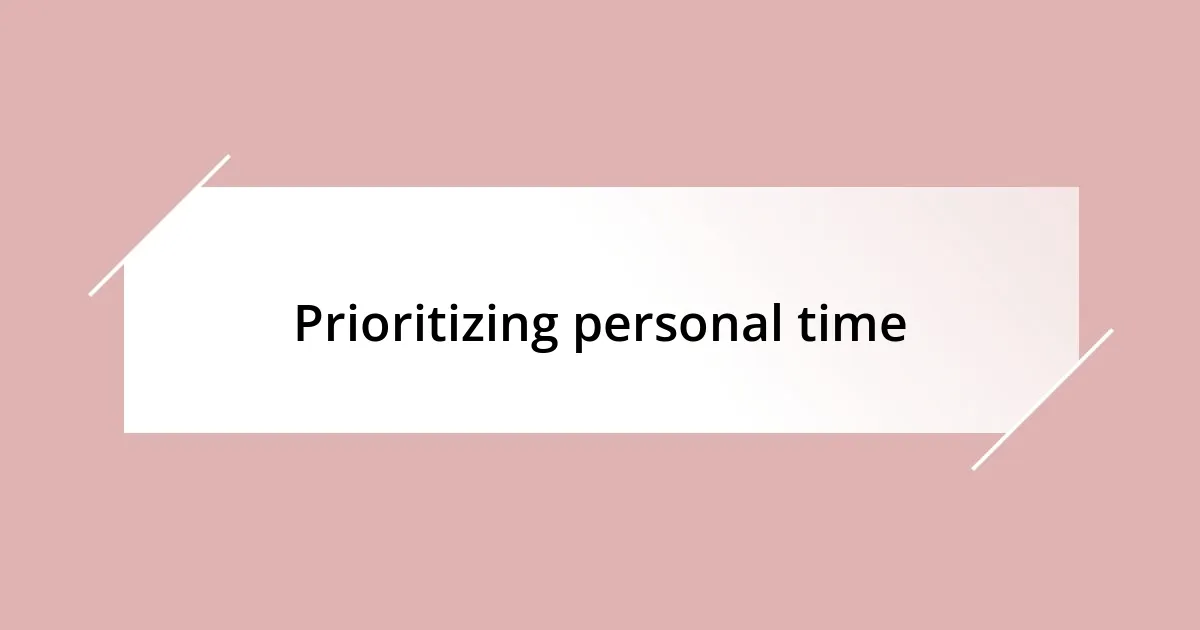
Prioritizing personal time
Prioritizing personal time has honestly been a transformative experience for me. I used to feel guilty about carving out moments just for myself, thinking it was selfish. Once, I blocked off one evening a week solely for me-time—no work, no distractions. I indulged in a long soak in the tub or picked up that book I had been meaning to read. It seemed trivial at first, but I can’t express how refreshing it felt. Have you ever noticed how just a little intentionality can revive your energy and spark creativity?
Creating a personal ritual has been invaluable. For instance, I’ve established a post-work routine that signals the transition from “work mode” to “personal time.” I pour myself a cup of herbal tea and sit quietly for a few minutes, allowing myself to unwind. This small act sets the tone for the evening well ahead of any scheduled plans. Have you thought about what rituals bring you back to yourself? It’s in these little practices that I rediscover my passions and recharge my soul.
Another fundamental aspect that I’ve discovered is the importance of saying “no.” It’s not easy, but the freedom that comes with prioritizing my time is astonishing. There were moments when I overcommitted to social events, trying to please everyone. I learned to evaluate invitations based on how they align with my personal time and well-being. What if you started asking yourself whether an activity truly adds value to your life? I now relish my time alone or with a few close friends, leaving me feeling fulfilled rather than drained. This shift has made a world of difference in how I approach both my work and personal life.
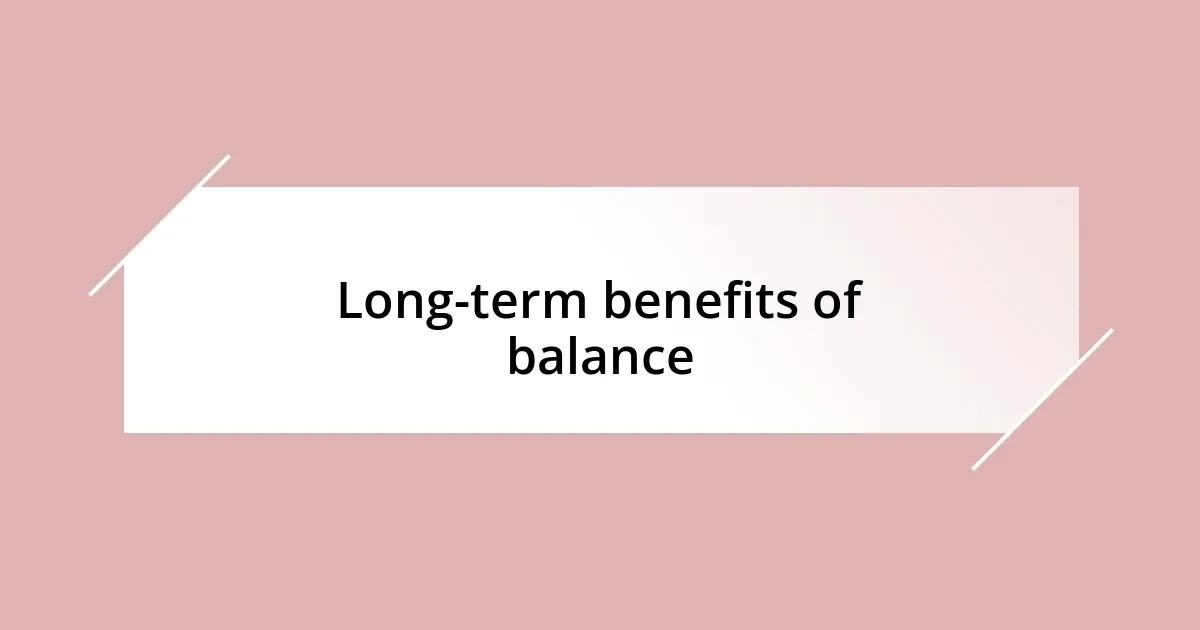
Long-term benefits of balance
Finding balance in life yields remarkable long-term benefits that I’ve personally experienced. I remember a time shortly after I started prioritizing this balance when I suddenly found myself less stressed and more focused on my tasks. This shift wasn’t just a fleeting feeling; it led to significant improvements in my job performance. Do you realize how much impact a clear mind can have on your output? It makes a world of difference.
Another advantage I’ve noticed is the positive ripple effect on my relationships. When I started dedicating time to both work and personal life, my interactions with family and friends became more meaningful. I can recall weekends filled with laughter instead of work emails; it was like a breath of fresh air. Have you ever taken a break from your routine and felt that immediate warmth of connection? It’s in these moments that I truly valued my relationships, cementing bonds that extended beyond superficial interactions.
I also find that maintaining a balance has a profound effect on my overall mental health. I used to dread Mondays because I felt burnt out by the weekend’s work catch-up. However, once I established a clearer work-life divide, my Mondays transformed into days filled with renewed energy and optimism. Isn’t it incredible how reclaiming your time can alter your perspective? Embracing this balance has not only equipped me with resilience but has also paved the way for long-term success in both my professional and personal endeavors.












